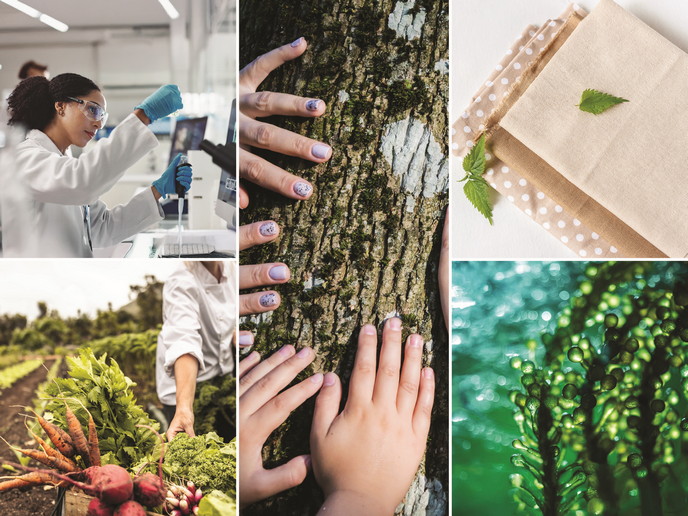
© HockleyMedia24peopleimages.com/stock.adobe.com, mihail39/stock.adobe.com, Rodica/stock.adobe.com, chokniti/stock.adobe.com, jacob lund.stock.adobe.com
Bioeconomy solutions work with renewable biological resources to conserve, restore, produce or consume food, materials, products or energy, including through cutting-edge technologies. They contribute to increased circularity, minimising waste and pollution, and maximising the use of materials and side streams, increasing the lifespan of products for as long as possible.
By combining these two approaches, the sustainable and circular bioeconomy supports the EU in achieving its climate and renewable energy goals by 2030, and climate neutrality (net-zero greenhouse gas emissions) by 2050. Fossil dependency and pollution are reduced by substituting fossil-based materials and fuels with bio-based alternatives, while the vitality of rural areas is increased, and biodiversity loss combatted. Europe’s farmers, forest owners and actors in the blue bioeconomy have invested significantly into bioeconomy solutions and are committed to scale them up in the future. Europe’s innovators have developed technologies and products that are independent from fossil resources, save biomass, energy or water, thereby helping to clean the environment and protect ecosystems.
These bioeconomy innovations will transform the way Europe uses and values biological resources, and promote a more sustainable, resilient and competitive economy.
Leveraging Europe’s biological resources
This overview of projects focuses on results that contribute to Europe’s position as the continent leading on bioeconomy solutions. These include making the most of biological materials, fostering the strategic management of biomass within ecological boundaries while driving the green transition.
Bioeconomy solutions are deeply rooted in research and innovation and include biotechnologies that contribute to Europe’s competitiveness while not posing risks to consumers or the environment. This overview highlights the circularity potential of the bioeconomy by demonstrating the efficient use of biomass side streams and waste, bringing innovations out of the laboratory into the marketplace, and promoting the importance of bioeconomy governance and education.
The Pack highlights 15 projects funded under the EU’s Horizon 2020 and Horizon Europe research programmes that are making an important contribution to bioeconomy. These initiatives demonstrate how innovations are successfully brought from ‘lab to fab’ and then to market, stressing the importance of bio-based materials, biotech, bioeconomy governance and education in achieving sustainable prosperity.
The MY-FI project produced high-quality and more sustainable bio-based materials for the textile industry from fungi. FutureEnzyme developed innovative methods to discover and design enzymes for the textile, detergent and cosmetics sectors.
ENOUGH created new technologies, tools and methods to reduce greenhouse gas emissions from refrigeration. SUSTCERT4BIOBASED promoted transparency and traceability of bio-based products along value chains.
BioRural created a European Rural Bioeconomy Network to promote small-scale bio-based solutions in rural areas across Europe. BlueRev empowered European local communities and advanced circular economy.
ShapingBio provided recommendations on how innovation can be strengthened in the European bioeconomy across sectoral, governmental and geographic levels. BioBeo created digital tools to teach young people about bioeconomy. CEE2ACT supported countries in developing circular bioeconomy strategies for central and eastern Europe.
RAINFOREST explored pathways to reduce biodiversity impacts of food and biomass value chains, thus supporting transformative changes in the bioeconomy that help reduce biodiversity loss. RESONATE used remote sensing data to create maps of disturbance hotspots across Europe.
AFTERBIOCHEM built a first of a kind manufacturing plant that turns non-food biomass into eco-friendly products. VIVALDI transformed carbon dioxide emissions from bio-based industries into organic acids.
Through the application of gene editing technology in potato and microalgae, GeneBEcon improved agricultural production and industrial processing for a sustainable bioeconomy. Finally, SCALE produced algae-based ingredients for the food, food supplements, feed and cosmetics sectors